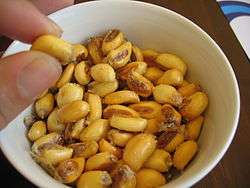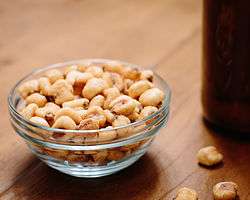Corn nut


Corn nuts, also known as toasted corn[1] or corn bits, are a snack food made of roasted or deep-fried corn kernels. In parts of South America, including Peru and Colombia, it is referred to as cancha.
Preparation
Corn nuts are prepared by soaking whole corn kernels in water for three days, then deep-frying them in oil until they are hard and brittle. The kernels are soaked because they shrink during the harvesting and cleaning process, and rehydration returns them to their original size.
History
Albert Holloway of Oakland, California introduced corn nuts to the United States in 1936. He originally sold them to tavern owners to be given away free to their patrons as a snack that would be great with beer,[2] calling them Olin's Brown Jug Toasted Corn.[1]
Varieties and brands
CornNuts
Holloway later renamed his product CornNuts. After Holloway and his sons Maurice and Rich learned of a breed of corn grown in Cusco, Peru (often referred to as Cuzco corn) that grew large kernels (some said to have been bigger than a U.S. quarter coin), the company researched developing a hybrid of the Cusco corn that could be grown effectively in California. After a decade of research, the company introduced CornNuts made with the hybrid variety in 1964.[2] CornNuts sold on the market today are no longer of the large Cusco corn size.
The most popular brand, CornNuts was owned by Holloway's original family company until the company was purchased by Nabisco[3] in 1998.[4] Cornnuts is a registered trademark of Kraft Foods.[5] It is currently available in seven flavors: Original, BBQ (barbecue-flavored), Nacho, Chile Picante con Limon, Ranch, Ultimate Heat and Jalapeño Cheddar.[6]
Cornick
A Filipino variant of corn nuts is cornick. Compared to the American variety, cornick pieces are typically smaller and crispier. Garlic is the most common flavor of cornick, with other common flavors including: chili cheese, adobo, barbecue, lechón manok (also known as roasted chicken), and sweet. Major brands include Boy Bawang (literally "Garlic Boy" in Tagalog, commonly sold in small packets), Corn Bits, and Safari.
A popular variety of cornick is the lighter, chicharrón-like chichacorn,[7] a semi-popped style of cornick using glutinous corn from the Ilocos Region[8] which is treated with lime before frying.[9]
Diana
Diana, a snack company in El Salvador, makes a variety of corn-nut-like snacks. These are called elotitos in Spanish, or Crunchy Cornbits.[10] These come in a variety of seasonings, such as Lemon, Cheese and Chili, and Barbecue. These are sold throughout Central America.
See also
References
- 1 2 Jenkins, Matt (November 2010). "Quest for Corn". Saveur. Bonnier (133): 26, 28. ISSN 1075-7864.
Albert Holloway of Oakland, California, first sold the fried, salted whole kernels in the 1930s under the name Olin's Brown Jug Toasted Corn [...] which Holloway later rebranded CornNuts
- 1 2 Foley, Michelle (2007-09-12). "What Are CornNuts?". Chow. CBS Interactive. Retrieved 2009-02-27.
- ↑ Pacciorini, Albert C. (1997-11-06). "Nabisco to Buy California-Based Cornnuts for Undisclosed Amount". The Monterey County Herald.
- ↑ "Former Cornnuts President Appointed as National Sales Director". Baywood International. 2000-03-21.
- ↑ "Trademark 'CORNNUTS' owned by 'KRAFT FOODS GROUP BRANDS LLC'". inovia. Retrieved 8 March 2015.
- ↑ "CornNuts". CornNuts. Archived from the original on 2012-11-15. Retrieved 2012-11-04.
- ↑ "Company History". Ilocos Food Products. Retrieved 2009-02-27.
- ↑ Palma, Ireneo B. (2004). "Experts Identify Promising Glutinous Corn Varieties for Green Corn and "Cornick" Production". Philippine Council for Agriculture, Forestry and Natural Resources Research and Development. Archived from the original on February 24, 2005. Retrieved 2009-02-27.
- ↑ See also: nixtamalization
- ↑ "Diana snacks, El Salvador, Elotitos". Retrieved 2011-04-23.